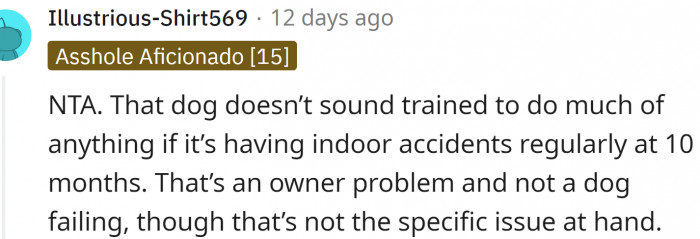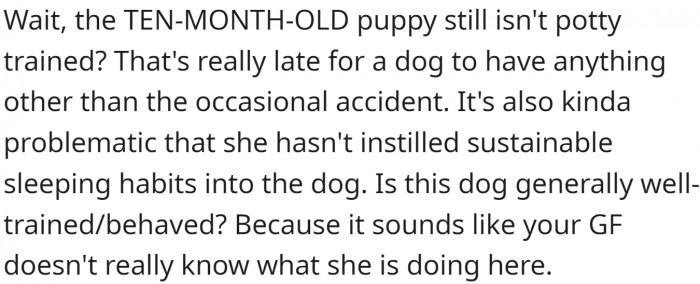Redditor Seeks Advice On How To Make His GF Stop Bringing Her Dog Into Their Bed
Dog ownership brings a lot of responsibilities, one of which is properly training them.
But how can you say no to that adorable face, begging for leftovers or trying to sneak into your bed? It is hard, but it needs to be done.
Boundaries must be set, and consistency is key. If you occasionally forbid your dog from doing something, all training progress is lost.
You will end up with a confused dog that won’t know if something is okay or not (they don’t understand much about context). And when the dog is confused, it can start acting up.
One Redditor posted their problem. He wrote: “My girlfriend insists on her dog sleeping in bed with us, but I’m not cool with it!”
And the story perfectly describes what a lack of consistency can do. He and his girlfriend have been together for several months now.
They are getting along nicely, except for one thing: she lets her dog sleep in bed with her.
This leaves him frustrated because, understandably, he wants to cuddle with his girlfriend, not her dog. The dog is still not fully potty-trained and has regular mishaps.
She agreed not to let the dog sleep with them but allows it on the bed when he is not around. Read the full story:
OP says:

He and his girlfriend have been together for several months now. They are getting along nicely, except for one thing:

She lets her dog sleep in bed with her. He wants to cuddle with his girlfriend, not her dog.

Exploring Relationship Dynamics in Shared Spaces
This situation reveals the complexities of intimacy and space within relationships, particularly how pets can influence partner dynamics. Dr. Julie Schwartz Gottman, a renowned relationship expert, emphasizes that shared spaces require negotiation and compromise, especially when pets are involved. Research shows that when partners communicate openly about their needs and boundaries, it fosters a healthier relational environment.
According to studies published in the Journal of Social and Personal Relationships, effective communication can significantly reduce conflict and enhance connection between partners.
Understanding Relationship Dynamics
The Redditor's desire for his girlfriend to stop bringing her dog into their bed speaks to underlying issues of personal space and relationship boundaries.
Research in relational psychology indicates that couples often struggle with establishing boundaries when external factors, such as pets, are introduced into shared spaces.
Dr. John Gottman's work on relationships highlights the importance of recognizing and respecting each partner's needs for intimacy and personal space.
In this case, the Redditor's feelings may stem from a need for exclusivity with his girlfriend that he perceives as threatened by the presence of the dog.
The dog is still not fully potty-trained and has regular mishaps.

She agreed not to let the dog sleep with them but allows it on the bed when OP is not around.

Last night, the dog was particularly upset

Moreover, the desire for personal space can often conflict with a partner's attachment to their pet. According to Dr. Michele Weiner-Davis, a renowned marriage therapist, "Understanding the dynamics of attachment can significantly improve relationship satisfaction." She emphasizes that recognizing different attachment styles is crucial for couples to navigate their boundaries and intimacy effectively. For more insights, you can visit her professional website at divorcebusting.com.
Furthermore, the girlfriend's attachment to her dog may complicate the situation. Studies indicate that pets often become integral to individuals' identities, which can lead to defensive reactions when discussing boundaries.
Research published in the Journal of Social Psychology shows that individuals may prioritize their pets' needs over their partners', leading to relational strain.
This dynamic underscores the need for open communication to navigate these feelings effectively.
They are trying to find a solution

Is OP the A-hole here?

OP has offered the following explanation for why they think they might be the asshole:

The Importance of Compromise in Relationships
The scenario underscores the necessity of compromise in relationships, particularly when it comes to shared living spaces and pets. Dr. John Gottman’s research on marital stability highlights that couples who engage in constructive compromise tend to experience greater relationship satisfaction. When partners are willing to find middle ground regarding personal space and pet interactions, it can foster a more harmonious living environment.
Furthermore, the ability to negotiate boundaries around pets can enhance emotional connection and intimacy, as it requires partners to consider each other's needs.
Practical Strategies for Compromise
To address this concern, the Redditor should engage his girlfriend in an open conversation about their shared space and boundaries.
Dr. Sue Johnson, an expert in emotionally focused therapy, emphasizes the importance of expressing feelings without blame to foster understanding.
Using statements like 'I feel less intimate when the dog is in our bed' can help articulate his needs while inviting dialogue.
This approach encourages the girlfriend to consider his feelings without feeling attacked.
That dog doesn’t sound trained to do much of anything

OP needs to make a decision:

What OP says makes a lot of sense:

Additionally, exploring each partner's emotional triggers can facilitate healthier conversations about shared spaces. Research indicates that when partners discuss their feelings openly, it promotes empathy and reduces misunderstandings. According to Dr. Sue Johnson, an expert in emotionally focused therapy, recognizing each other's emotional needs is essential for fostering connection and understanding.
Additionally, proposing designated spaces for the dog may provide a compromise that respects both partners' needs. Research suggests that creating structured environments for pets can enhance their well-being while respecting personal space.
By working together to establish boundaries that include both their needs and the dog's, the couple can strengthen their relationship and promote mutual respect.
Ultimately, fostering a collaborative dynamic will help both partners feel valued and understood.
Dogs love consistency.

Consistency doesn’t seem to be achievable here

"It is possible to train a dog to only sleep in the bed on command."

Practical Recommendations for Couples
To navigate the complexities of sharing a space with pets, couples can implement practical strategies that promote understanding and collaboration. Establishing clear boundaries regarding where pets can and cannot go can help alleviate tension. Moreover, engaging in joint activities with the pet, such as training or playtime, can enhance the bond between partners and their pet while fostering teamwork.
Research shows that couples who engage in shared activities often report higher levels of satisfaction and connection in their relationships.
But that's not easy to achieve

Is OP ready to play #2 to a dog?

OP should talk with his girlfriend

Ultimately, navigating the dynamics of shared living spaces requires open communication and a willingness to compromise. By fostering an environment where both partners feel heard and respected, couples can create a more harmonious living situation that enhances both their relationship and their bond with their pets.
This is so true:

Beds are for people to get good nights' sleep so they can function.

It sounds like she doesn't really know what she is doing here.

Dogs are social animals. That’s the reason we love them so much.
And they get incredibly attached to their owners. That’s why we love them even more.
But they must know boundaries. The dog in question is just a puppy, and let’s try to see it from his side.
He has an owner who lets him sleep in her bed but is now chased away by a newcomer. And when the newcomer is not there, he is allowed on the bed again.
Of course, the dog will hate the newcomer and have accidents due to anxiety.
Psychological Analysis
This situation highlights the challenges that pets can introduce into romantic relationships. It's common for partners to have differing needs regarding personal space and boundaries. Open dialogue and a willingness to compromise are essential for maintaining harmony in these dynamics.
Analysis generated by AI
Analysis & Alternative Approaches
In conclusion, navigating relationship dynamics involving pets requires open communication and compromise.
By discussing boundaries and creating a shared understanding, couples can foster a supportive and respectful environment that honors each other's needs.
Analysis & Alternative Approaches
Insights from relationship psychology highlight the importance of communication and compromise in shared living situations. According to Dr. Gary Chapman, a renowned marriage counselor, "Effective communication is the foundation of any healthy relationship." He emphasizes that fostering open discussions can significantly enhance relationship satisfaction and emotional connection. For more insights, visit his professional website.



